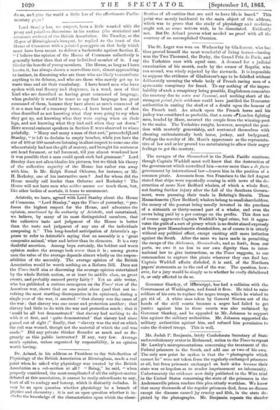Lord Stan! ,y has, we suspect; been a little wearied
with the prosy and pointless discussions in his section (the statistical and economic section) of the British Association. On Tuesday, at the Mayor of Birmingham's banquet, he replied to the toast of the House of Commons with a poiutel panegyric on that body which must have been meant to deliver a backstroke against Section E. " I believe the opinion of the House of Commons collectively is generally better than that of any individual member of it. I say this for the benefit of young members. The House, as long as I have known it, has always shown a marvellous tact, almost approaching to instinct, in discerning who are those who are likely to contribute anything to its debates, and who are those who merely get up to waste time and air their vocabulary. I have heard men who have spoken with real fluency and eloquence, in a word, men of that kind who are described as having great command of language, when probably it would be truer to say that language has great command of them, because they have about as much command of it as a man has of a runaway horse,—I have heard men of that class described as not knowing what they were going'to say when they got up, not knowing what they were saying when on their legs, and not knowing what they had said when they sat down." Here several eminent speakers in Section E were observed to wince painfully. " Many and many a man of that sort," proceededlLord Stanley, " is left to declaim to empty benches, while you have the ear of 400 or 500 members listening in silent respect to some one else who certainly had not the gift of oratory, and brought his sentences out head foremost, or tail foremost, till you almost wondered how it was possible that a man could speak such bad' grammar." Lord Stanley does not often idealize his pictures, but we think his theory of the collective sagacity of the House has rather run away with him. Is Mr. Ralph Bernal Osborne, for instance, or Mr. H. Berkeley, one of his instructive men ? And for whom did the House usually call louder than Osborne and Berkeley? The House will not have men who neither amuse nor teach them, but, like other bodies of mortals, it leans to amusement.






























 Previous page
Previous page